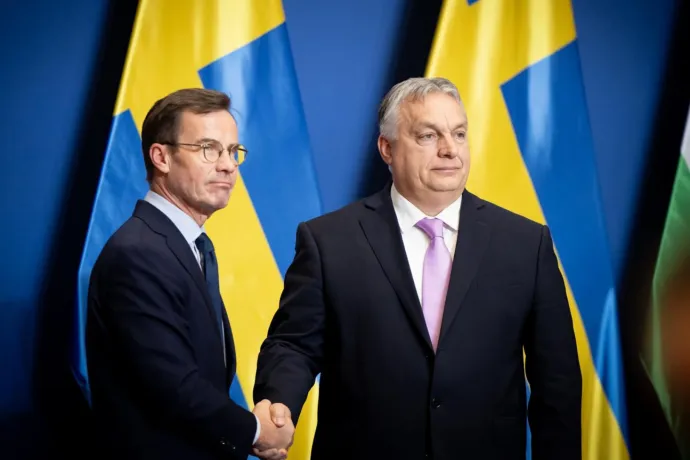Hungarian parliament votes in favour of Sweden's NATO membership

After more than a year and a half of wrangling and various messaging from the Hungarian government, on Monday, Parliament finally voted in favour of Sweden's accession to NATO.
Along with Finland, Sweden decided to join NATO in May 2022, after the Russian-Ukrainian war broke out. Twenty-eight of the military alliance's thirty member states ratified the application almost immediately thereafter, with Turkey and Hungary having been the only two countries that kept the two militarily strong countries waiting.
After Viktor Orbán's quick visit to Ankara last spring, Hungary voted in favour of the Finns membership almost exactly at the same time as the Turks, but still kept the Swedes waiting. Turkey finally approved the Swedish accession in January this year, but the Hungarian leadership still wasn't convinced, so despite the government's previous insistence to the contrary, Hungary ended up becoming the last NATO member state to approve their accession.
Although the government submitted the ratification proposal to parliament in July 2022, the vote has been delayed since then for a variety of reasons:
- A social consultation – conducted via a hidden email address on the government's website – is underway.
- Parliament is busy – the government claimed it was busy adopting the proposals needed to reach a deal with the EU.
- There is a serious debate within the Fidesz-KDNP parliamentary group on the issue.
- The conflict with Sweden must be settled – so a negotiating delegation was sent to Sweden.
- Insult – according to the Hungarian governing parties, the Swedes have insulted the Hungarians.
- The Swedish PM should come to Hungary first.
Ulf Kristersson finally came to Budapest last Friday, and the ice was broken and almost completely melted within hours: the governing parties announced their support for the Swedish accession to NATO, claiming that the visit of the Swedish Prime Minister "took the relationship between the two countries in a very good direction".
At the meeting, the two prime ministers agreed that Hungary would buy four JAS 39 Gripen fighter jets, adding to the 14 Gripens it has been leasing – although not once has the Hungarian side previously indicated that its delay was due to seeking to secure such an agreement, in addition to the various gestures it had expected. Even though the Turks' mood for approval also came following a military agreement, they had made no secret of what they wanted from the start.
At this stage it is unclear how much the Gripen purchase will benefit Hungary. According to the Defence Minister, the operation and logistics contract has been signed for the whole fleet for the next ten years, and they have also agreed on cooperation on training. The Hungarian air fleet will thus not only improve the protection of the Hungarian airspace, but will also contribute to NATO missions in other NATO member states. In addition, as a result of the cooperation between the Ministry of Defence and the Swedish defence company SAAB, a Centre of Excellence using artificial intelligence will also be established.
The cost of the agreement is not known, nor have the details of the agreement been disclosed. What is certain, however, is that more than a year and a half of wrangling over Sweden's NATO membership has been concluded with a spectacular deal.
The Hungarian Parliament's declaration of ratification will only enter into force once it has been signed by the President of the Republic and published in the Hungarian Official Gazette. This should be done by László Kövér in the next eight days, since, following the resignation of Katalin Novák, he will temporarily take over the duties and powers of President of the Republic until the governing party candidate, Tamás Sulyok, takes office. Kövér, on the other hand, has been one of the most vocal opponents of Sweden's accession to NATO over the past year and a half. "I'm not sure we should vote for it," he once said.
If the Head of State disagrees with the law or one of its provisions, he can send it back to parliament for consideration before signing it. In this case, the parliament has to discuss and vote on the law again. And if the Head of State considers a law to be contrary to the Fundamental Law, he can send it to the Constitutional Court before signing it, which will then assess whether the law is in line with the Fundamental Law.
For more quick, accurate and impartial news from and about Hungary, subscribe to the Telex English newsletter!